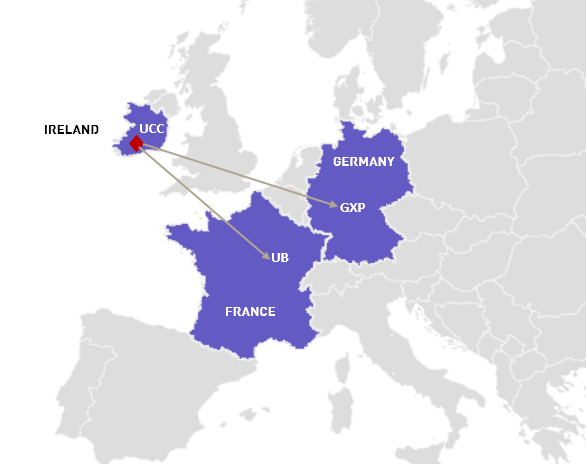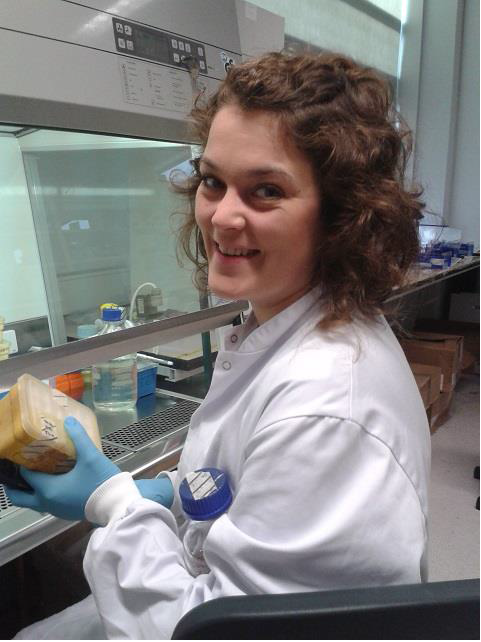PRESENTATION OF THE SUB-PROJECT 2
Stress pre-adaptation and virulence potential of L.monocytogenes in the food matrix

Host organisation: University College Cork (UCC) Secondments: University of Burgundy (UB) and GenXPro (GXP)
HOST INSTITUTION AND SUPERVISOR:
University College Cork, Dr. Cormac GAHAN (more details)
OBJECTIVES:
The project will examine the effects of important food components (including glutamate, arginine and carnitine) upon virulence potential in L. monocytogenes. The ESR will utilise the ECadhum transgenic mouse system as a means to study the influence of food constituents upon pathogenesis using the pathogen in suspension (+/- specific food components) and also using special defined chow containing particular food components as additives (from Teklad/Harlan custom diets). The ESR will utilise classical microbiological approaches as well as bioluminescent imaging of L. monocytogenes to track the pathogen in this system (IVIS system luminescence imaging). The ESR will also use deep sequencing approaches to determine the effects of food constituents upon gene expression profiles in L. monocytogenes with a particular focus upon gene systems known to be induced in vivo during growth in the GI tract and necessary for virulence (e.g. SigmaB, BSH, bile, ADI, OpuC, GAD etc).
EXPECTED RESULTS:
Global transcriptomic response to food matrix constituents . Determination of TSS. Identification of proteins critical for survival in this habitat.
SECONDMENTS:
GenXPRO (more details) and University of Burgundy (more details)
DURATION OF THE RECRUITMENT :
36 months
PRESENTATION OF THE FELLOW
Vanessa LAS HERAS
MY PREVIOUS TRAINING AND EXPERIENCE:
I am 24 years old and I am from Faro, south of Portugal. I studied my Bachelor degree in Biotechnology in Algarve University, Portugal, and participated in an ERASMUS exchange program to Lund University, Sweden, in the last year of my degree. Furthermore I have a Master’s degree in Biotechnology, from Lund University as well. During my education I focused on disciplines related with gene technology and genetic engineering, metabolic and protein engineering and biotechnology processing and analytic techniques (bioprocessing and process design and optimization, chromatography, qPCR and flow cytometry, among others).
For my Bachelor’s final project I studied qPCR optimization, where I explored the effect of reagents variation in overcoming limitations in DNA amplification and quantification caused by inhibitors in forensic human DNA samples.
My Master’s thesis was focused on single cell analysis of the redox potential during bioprocessing for the production of pharmaceutical valuable compounds. During this project I analyzed the redox potential and cell viability of yeast cells by a reporter system using flow cytometry and studied the boundaries of the implementation of such techniques under processing conditions. I also considered the heterogeneity of the cell population in the bioreactor and its impact on production yield.
WHY I WANTED TO JOIN THE PROJECT :
By joining this project I aim to expand my knowledge to different techniques, especially regarding bacterial virulence genes regulation. Promoter regulation during gene expression is my favorite field of interest. With this project I will be able to analyze the variation in gene expression, not only from the pathogenic bacteria that is the focus of the study, but also the microbiota and the host in the surrounding environment during infection.
UCC is a very dynamic University with a very good background in Listeria monocytogenes research, an important aspect that contributed to my choice of project. Furthermore is a very well technologically equipped institute, giving me the right tools to successfully make my research project.
ABOUT MY RESEARCH PROJECT :
My project will allow understanding, in an in vivo model, how the virulence is affected by the different environments and the presence of other microorganisms inside the gastrointestinal tract. Furthermore I will also focus on the effect of diet in the microbiota and in the expression of the virulence factors of Listeria monocytogenes. Having this in mind I will be able to correlate how Listeria interacts with the surrounding microbiota, which environments are more favourable and how food components allow adaptation to unsuitable conditions (such as low pH and high osmolarity).
Carnitine is a compound that is present in processed meat foods (such as sausage and pates), and has been proven to interact with the virulence factors of Listeria acting as an osmo protectant, allowing adaptation during infection in the small intestine. For this reason carnitine will be my focus in this study. Furthermore due to the alimentary changes in the current society it is of relevance to consider the impact of a high fat diet on the pathogen infection, since it has been proven that this diet increases cellular permeability.
For this project I will feed mice with a high fat and a high carnitine diet and compare, with the normal diet, how virulence is affected and which organisms are present in the microbiota by studying the mice liver, spleen, lymph nodes and faeces. The main difficulty I expect to have is related with the size of my faecal samples, since I have to extract a lot of information from these samples. Furthermore, from the animal model experiments I will generate a lot of data and therefore data handling may also be a difficulty I will face during my project.
OTHERS INTERESTS :
I love live music, especially Jazz and Blues. Cork is very famous for all the live music every day of the week and I like to go out every Friday to a special pub called Oliver Plunkett. Besides UCC has a very good sports project, with free gym for all the student (including PhD students) which I like to go together with my lab partners.
CONTACT :
![]() This project has received funding from the European Union’s Horizon 2020 research and innovation programme under the Marie Sklodowska Curie grant agreement n° 641984
This project has received funding from the European Union’s Horizon 2020 research and innovation programme under the Marie Sklodowska Curie grant agreement n° 641984

